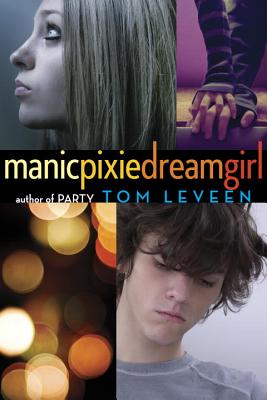Meet the Writer - Tom Leveen
Yes. I just compared up-and-coming YA author Tom Leveen to the Martin Scorsese of 80's teen angst: John Hughes.
An author interview on the craft of writing.
Featured Writer: Tom Leveen
Book: manicpixiedreamgirl, Contemporary YA
In celebration of Tom's latest book, and because I LOVE MY READERS :D I am giving away a signed copy of manicpixiedreamgirl! Read on, and enter for your chance!!I said it when I read Party, Tom Leveen's debut novel, and I'll say it again: I will be very very shocked if we don't see a TV or movie adaptation of his work sometime in the near future. While Party could easily be adapted into an MTV series (each of eleven chapters is told from a different character's point-of-view, all on the same night - at a high school party), and Zero has an indie-film feel, manicpixiedreamgirl is like today's version of a John Hughes film.Yes. I just compared up-and-coming YA author Tom Leveen to the Martin Scorsese of 80's teen angst.And it's apropos, considering, in Tom's own description of himself freshman year, he had "that whole John Bender thing going," or at least that's the look he was going for at the time. But as all of us former freshmen know, the look you want to have is much further from the persona you actually project. We want to be badass, confident and sexy; when in actuality we are awkward, nerdy, and to most of the world, still "kids."In manicpixiedreamgirl's Tyler—loosely biographical—Tom captures these feelings to a T. Internally, the rush of what you wish was your reality, all the hopes, dreams, and feelings flowing like a fast-moving river; the image of yourself looking fabulous, walking up to your crush and reciting some impressive commentary on Whatever Is Relevant At The Time. But externally, you can barely look them in the eye, and what you really say—the still-puddle of one-syllable responses: "yup," "nope," "uh..." John Bender reduced to Brian Johnson.I first introduced you to Tom in this guest post for Will Write for Coffee. When I met him, Tom had just released his first book, Party, and gave a presentation at our regional SCBWI conference. I had loaned out my copy of Party to a friend, and had stupidly forgotten my wallet in my other purse and wasn't able to buy a copy at the conference. Being a geek, I like to have signed copies from authors I've met. I asked Tom if I could order a signed copy online. He did the absolute coolest thing right then and there—checked to make sure no one was looking, held his finger in a "shh," and slipped me a copy from his messenger bag, which I then sheepishly brought to the autograph table about 10 minutes later. He's been a rock star in my mind since.Even better, after I'd asked him to do this interview, he was scheduled to appear at out local Indie, Changing Hands Bookstore, for the release of manicpixiedreamgirl. I dragged my 15-year-old son and his friend along, and listened to them complain all the way about how boring it would be. I had to bribe them with Jamba Juice just to go with me. (Really, five bucks for a fruit shake?) I forced my son to actually sit down with me during the presentation, rather than let him wander around the store wreaking havoc. What a heinous mother I am.About two seconds into Tom's presentation, my son and his friend were laughing hysterically, and I was laughing so hard I was crying. He is so animated and enthusiastic about what he does, and grateful for his ability to do it, it's infectious. And by the time he's done relating Tyler's story to his own evolution, you are pretty much just as in love with his wife Joy as he is. Seriously, if your school or organization is thinking of an author visit - don't even look anywhere else - Tom will entertain and motivate like none other. And if Tom isn't enough, his son Toby will definitely do the trick.It's an honor and a privilege to introduce you.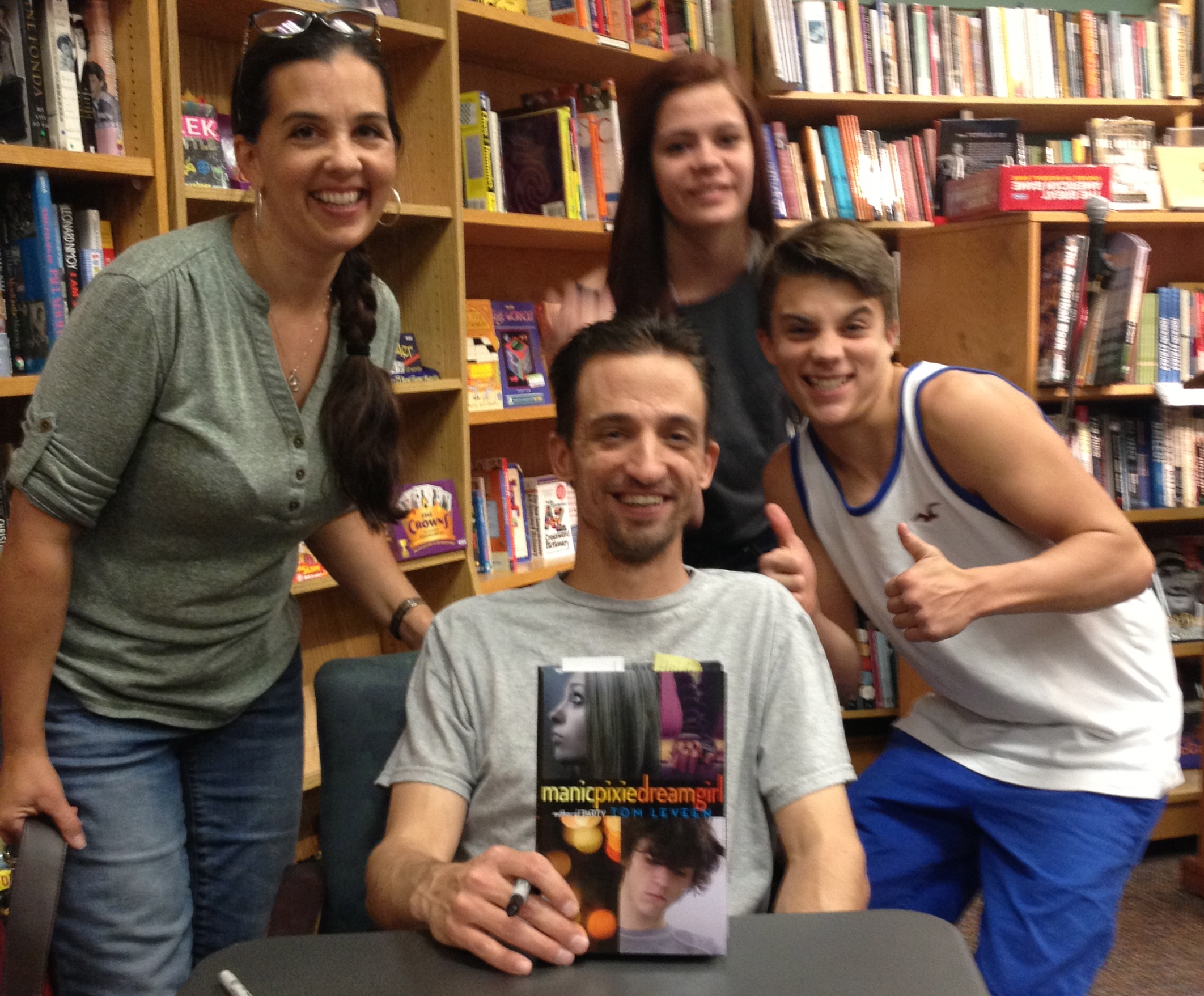
Meet the Writer: Tom Leveen
On craft:
How old were you when you started writing?I wrote my first story in second grade, so, about seven years old I think. My teacher made me rewrite it and read it aloud to the first graders. At first I thought I was being punished for something, but once I got up in front of the class, I knew I wanted to do this for the rest of my life: tell stories and be in front of an audience. So that’s worked out well.Where do you write?I write in an indie coffee shop not far from my house, and also in my home office.
When do you write?New stuff—brand new, no revision-type stuff—I generally do in the mornings. I used to stay up all night and write, and I miss doing that, but having a toddler has that effect. I use afternoons and evenings to do editing or revision, as well as other business stuff. Like answering interview questions!What helps you write—music, pictures, maps, journals, etc.—what gets you into that mindset?A routine.I recommend this to all writers. If you can get into a pattern, your brain starts to make associations. Like at my coffee shop, there’s a certain table and certain chair I always use, and within a few minutes of being there and getting set up, I can feel my brain (usually) start to click over to the job at hand, which is continuing that day’s story.Beyond that, internet research helps me a lot. The more I dig into a topic and click around on websites, the more ideas I get. I do usually make playlists for my stories, too, but I don’t listen to music while I write anymore. Sometimes when I’m making copyedits, but that’s it.What are some things that stand in your way? logistically as well as creatively?See above!No, really, the internet is without doubt the writer’s best friend, apart from time. But it’s also a curse, because man, you start off with just needing to know some quick obscure fact, like the capital of Guam, and then an hour’s gone by and you haven’t written a word. And by “you” I mean “me,” of course.Creatively what makes me stumble is doubt coupled with certainty. For whatever reason, the stuff that I feel most excited about turns out to be my worst writing, and the stuff I’m sure sucks is inevitably what my agent picks up on and wants to read more of. So it gets very confusing in my head sometimes.What do you do when you "hit a wall?"It depends. I’ve gotten better at being honest with myself and how I’m feeling, be it physical or mental. There are some days like, “You know what? This ain’t gettin’ done. It’s just not happening.” When I feel like that, then I pack it in and do something else for the rest of the day, and try again tomorrow. Then there are other times I hit a wall, but I can still feel like the words are there, the story is there; I just have to figure it out. In those cases, a walk helps. Pacing around the house. Talking out loud. Anything to let my mind wander for a bit. Usually within ten to thirty minutes the dam breaks.Beyond that, I will often just open a new story and start something new or work on something old. Let my subconscious figure it out. Do you use an outline—do you know exactly how the arc will play out—or do you just let the story develop as you write? If so, how do you outline? (notecards, etc.)Hm…good question. I guess both.What tends to happen, lately, is I free write a first draft, or at least half a first draft, and then go back and give it an outline. Sometimes I’ll use the Hero’s Journey as a template, not necessarily point by point, but just to see if there is in fact, you know—a plot. (There isn’t always, especially in that first draft.) My outlines usually just consist of a Word doc with notes (often longer than the book itself, it turns out), and sometimes an Excel doc so I can move things around and keep the plot points, character names and locations, etc., organized.In terms of the arc, I don’t usually know exactly how things will turn out, though on some stories, I discover the ending about halfway through the writing. Zero’s ending has been the same since the first draft in 1993. For manicpixiedreamgirl, I knew most of where I wanted it to end up. But with Party – which went through more drafts than the other two – I never did know for sure how to tie it up until just before we pitched it.How do you draft/revise? (i.e. do you just get it out in one big "dump," then revise, revise revise, or do you revise and edit as you go)I try hard to get the first draft out all in one go. Usually what happens is I’ll do a bit of revision as go, though. If I stop to revise too much, the book never gets done. And there’s no point in revising a story that had no middle or end. I think I’ve gotten better about completing those first drafts. They are awful, but that’s what first drafts are for!What are some tools that you use? (reference guides, manuals, websites—a favorite pen/notebook/computer)Well, I use the internet pretty extensively for research, whether it’s just a quick fact check or more in-depth. I often use videos, too—documentaries, usually, or travelogues. I do all of my composing on my desktop and an obsolete netbook. Come to think of it, the desktop is obsolete too, but I can’t stomach the newer versions of Word. I want my old 2003 version, thanks.Lately I’ve also appreciated using a handheld recorder or the sound recording option on my cell phone to speak quick notes or lines of dialogue before I forget them. That’s been hugely helpful.Beyond that, I don’t really have anything special to use while writing. I don’t think…Do you use critique groups? How did you find them?I do not, at the moment, but I did before I was published. I highly recommend the forums at www.absolutewrite.com, without whom I would never have gotten my first agent. No question.I haven’t really had a formal critique group since college. I think there is value in them, but I also thing aspiring writers need to know what to look for—namely, people (or just one or two good beta readers) who will not only be honest, but know what to be honest about.I’ve taken some creative writing classes that I really enjoyed attending, for instance, but in hindsight realized: I didn’t learn a damn thing! The feedback was nice and encouraging, and I made a few changes that helped the story…but a bunch of people saying “I liked this; I didn’t like this” is not the same as a knowledgeable person saying, “Your pacing is too slow in chapter two. Your secondary characters are flat and uninteresting. The plot is too convoluted. Cut chapter four entirely.” Things like that. Concrete ideas and suggestions that turn a decent book into a marketable book.I don’t know how to find those. But if anyone in the group has published, that helps. But the real hard part is listening to criticism and knowing when the criticism is right. I always recommend checking local libraries and indie bookstores for groups.
Do you use an outline—do you know exactly how the arc will play out—or do you just let the story develop as you write? If so, how do you outline? (notecards, etc.)Hm…good question. I guess both.What tends to happen, lately, is I free write a first draft, or at least half a first draft, and then go back and give it an outline. Sometimes I’ll use the Hero’s Journey as a template, not necessarily point by point, but just to see if there is in fact, you know—a plot. (There isn’t always, especially in that first draft.) My outlines usually just consist of a Word doc with notes (often longer than the book itself, it turns out), and sometimes an Excel doc so I can move things around and keep the plot points, character names and locations, etc., organized.In terms of the arc, I don’t usually know exactly how things will turn out, though on some stories, I discover the ending about halfway through the writing. Zero’s ending has been the same since the first draft in 1993. For manicpixiedreamgirl, I knew most of where I wanted it to end up. But with Party – which went through more drafts than the other two – I never did know for sure how to tie it up until just before we pitched it.How do you draft/revise? (i.e. do you just get it out in one big "dump," then revise, revise revise, or do you revise and edit as you go)I try hard to get the first draft out all in one go. Usually what happens is I’ll do a bit of revision as go, though. If I stop to revise too much, the book never gets done. And there’s no point in revising a story that had no middle or end. I think I’ve gotten better about completing those first drafts. They are awful, but that’s what first drafts are for!What are some tools that you use? (reference guides, manuals, websites—a favorite pen/notebook/computer)Well, I use the internet pretty extensively for research, whether it’s just a quick fact check or more in-depth. I often use videos, too—documentaries, usually, or travelogues. I do all of my composing on my desktop and an obsolete netbook. Come to think of it, the desktop is obsolete too, but I can’t stomach the newer versions of Word. I want my old 2003 version, thanks.Lately I’ve also appreciated using a handheld recorder or the sound recording option on my cell phone to speak quick notes or lines of dialogue before I forget them. That’s been hugely helpful.Beyond that, I don’t really have anything special to use while writing. I don’t think…Do you use critique groups? How did you find them?I do not, at the moment, but I did before I was published. I highly recommend the forums at www.absolutewrite.com, without whom I would never have gotten my first agent. No question.I haven’t really had a formal critique group since college. I think there is value in them, but I also thing aspiring writers need to know what to look for—namely, people (or just one or two good beta readers) who will not only be honest, but know what to be honest about.I’ve taken some creative writing classes that I really enjoyed attending, for instance, but in hindsight realized: I didn’t learn a damn thing! The feedback was nice and encouraging, and I made a few changes that helped the story…but a bunch of people saying “I liked this; I didn’t like this” is not the same as a knowledgeable person saying, “Your pacing is too slow in chapter two. Your secondary characters are flat and uninteresting. The plot is too convoluted. Cut chapter four entirely.” Things like that. Concrete ideas and suggestions that turn a decent book into a marketable book.I don’t know how to find those. But if anyone in the group has published, that helps. But the real hard part is listening to criticism and knowing when the criticism is right. I always recommend checking local libraries and indie bookstores for groups.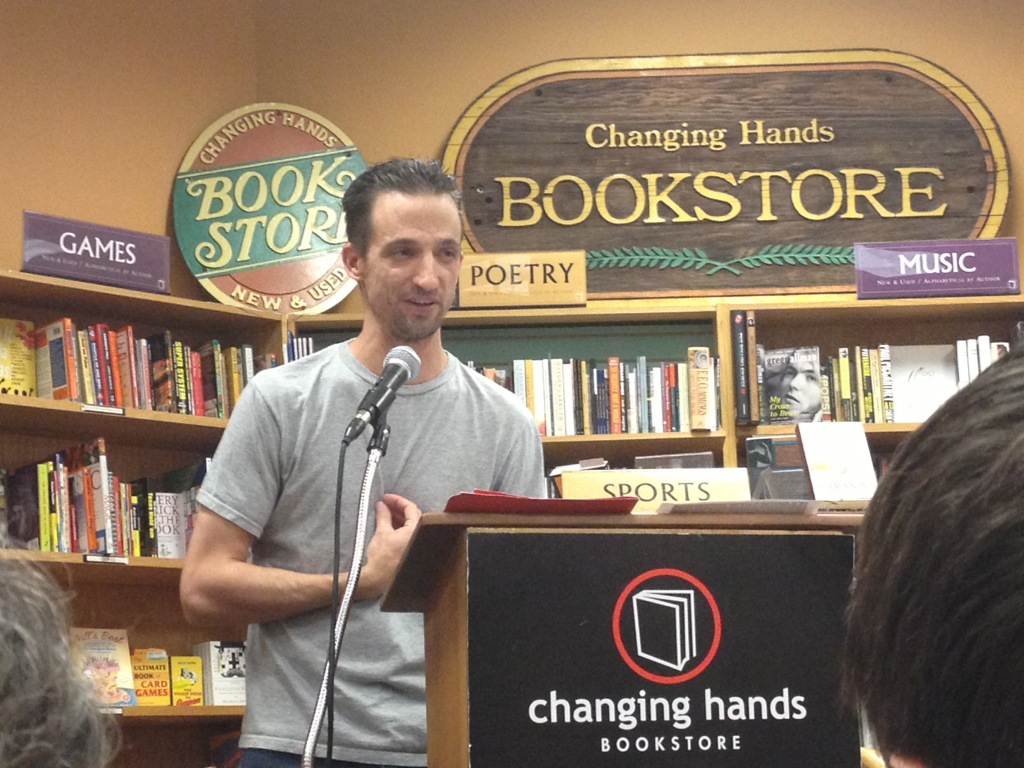
On your current project:
What was your inspiration for this book?Real life! Sort of.I actually already had an outline of manicpixiedreamgirl that formed the spine of a one-man play I wrote and directed a few years out of high school, which itself was loosely based on real events. But manicpixiedreamgirl is not autobiographical; it’s just emotionally true to what I experienced.What kind of research did you do for this book? And, were you surprised by something that you learned in your research?I didn’t need to do much research with manicpixiedreamgirl, because it dealt with writing and theatre, two things I know a lot about. And since the story already had a framework from the play, there wasn’t much to look into.On the other hand, for Sick (Oct. 1, 2013, Abrams/Amulet), I had to do a ton of medical research. Gross, disgusting medical research. I was surprised that my initial concept for the “zombies” in the novel (they are not undead, though the characters have a whole debate about that) was reasonably medically based, or at least could be.How good did it feel to write that last line?For manicpixiedreamgirl? Very good. Like closure. Much like Zero, this one had been with me a long time, and it was nice to put it to bed.
On the business of publishing:
How did you find your agent/editor?I used AgentQuery.com and resources on AbsoluteWrite. I may have even used a print version of Writer’s Market, come to think of it. I built an Excel sheet with the agency’s name, agent’s name, when I submitted, and what if any response I got. I got picked up after about forty rejections by Andrea Brown Literary Agency, and I’ve been there ever since. How has self-publishing shaped your career as a writer? / What is your opinion of self-publishing?I haven’t yet done it, so I can’t speak with any authority. I will underline the “yet,” though, as I am already in the early stages of planning some self-published work.My opinion of self-pub is this: One, it’s not going away. Two, to paraphrase Jeff Goldblum in Jurassic Park: “Writers can get so preoccupied with whether or not they could that they didn’t stop to think if they should.”I’m less of a doomsayer about traditional publishing and agents than some of my best writer friends, but there’s no doubt the industry has changed and will continue to change. But I will also say that my most valuable instruction came from my agents and editors. I always recommend that writers give the traditional route a try first, if only for the experience of revision (and revision and revision and revision…) that goes into a good, marketable novel. Being able to write a good query and condense that novel into 200 words or less is a good skill to have for someone going the indie route.I try to say this to every writing class I teach: Writing fiction is a business. And self-publishing is twice or more the work traditional publishing is because you’re doing it all alone. Yes, there are examples of big breakthroughs, but they are in the minority.My friend Erin Jade Lange (author of Butter) recently said at a conference, “You have to love writing more than showers.” She’s dead right. You have to love this more than just about anything else on earth to make a real go of it. The man-hours it takes to really, truly put out a great novel is daunting. Or should be, if you’re think about it enough. Finishing up your NaNoWriMo book and plugging it into Smashwords on December 1 is not how to do it.Sound advice to all the NaNos out there! What can you share with our readers about marketing? (i.e. what, if any, support did you have from your publisher? Costs involved? Things that worked best/weren't worth it, etc.)Ya know, this is my major weakness. I’m still learning. I think postcards are a great idea, I carry those around with me. Business cards are still useful. Having an online presence is essential, even if you don’t want one.Really the biggest thing was making ARCs and e-galleys available to the book bloggers out there. That’s where a lot of interest gets generated.But when it comes to MG and YA authors, there’s no beating getting yourself in front of students. You don’t need a gimmick or anything; just be yourself and talk about things that matter to you in a way that will matter to them. I think I sell about as many books based on my writing classes and presentations as I do what any journal has to say about the novel itself.(As I stated above, I can attest to Tom's presentation skills. Not only have I seen him talk about his books, but I've taken his "Say Words" writer's workshop. He helps writers portray realistic teen dialogue. And, the class that Tom had been working with at Estella Mountain HS came all the way across town just to celebrate his book release. Think he speaks to kids? Yeah.)
About You:
What is a trick that you've learned along the way that has made the writing process easier?None that I am aware of…Okay, no, just kidding. For me, (relative) silence and having a schedule. Those two things have helped more than anything else. Some authors call it “B.I.C.” which means, Butt In Chair. It means there’s no substitute for sitting down and writing. Now, I myself often stand while at my coffee shop, because they have these great, tall bar tables. But you get the drift. Even if the only time you can write is Thursday morning from five a.m. to seven a.m., then by cracky, that’s when you will write. And the more you do that, the easier it gets.What writers inspire you?The late John Bellairs (The Mummy, The Will, and The Crypt) influenced me a lot. So did early Stephen King stories and novels, and most of Robert Cormier’s books (The Chocolate War, etc.) I kind of want to be Laurie Halse Anderson when I grow up . . . or at least have the range of influence she does. I’d put A.S. King in there, too. These women are at the forefront of tangibly changing the lives of adolescents, and that’s what I want more than anything.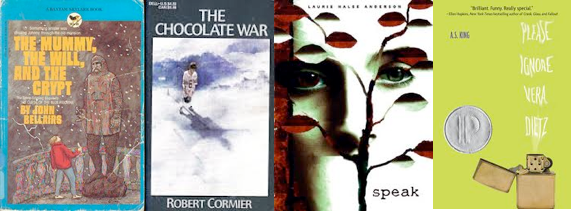 Really the writers who inspire me are the writers who I’ve become friends with since this whole thing started. There’s a whole clutch of YA and MG writers here in the Phoenix and wider Arizona area, and they are truly awesome people. I learn – present tense – a lot from them.What do you like to read for enjoyment?Lately I have been reading a lot of nonfiction. It started when a good friend of mine recommended the popular book Born To Run. I really enjoyed that. Then she recommended another that I fell in love with Animal Vegetable Miracle by Barbara Kingsolver. A third followed. So now anything she recommends to me, I will read.Then I began reading up on Gandhi while doing research, and that led to a whole list of must-reads. So these days, if I’m not re-reading some middle-grade novel from the eighties that I grew up with (kind of like comfort food, only, in words), I’m reading one or more nonfiction books on any number of topics.We all know that learning from our mistakes is part of the process of becoming who we are. As a writer, what's one lesson you've learned that you would like to pass on to others?Writing fiction is a business. Sorry to go all serious on you, but yeah – the instant you decide you want someone to pay you for writing fiction, you are a small business owner. Act like it.I'm so glad you said that. I think more writers need to realize that being an author is WAY MORE than writing a book.What's next for you?Next is Sick (Abrams/Amulet), which releases October 1, 2013. After that is Random (Simon Pulse) in Summer 2014. I’m getting some side projects worked up, slowly. Mostly I just keep looking for places to present and to teach. It’s the best part of all this.I can imagine. After seeing you speak several times, it shows that you really enjoy teaching others about writing, especially kids. Thank you so much, Tom! I hope everyone has learned more about what it takes to be a writer. Readers, see below for more of Tom's books, and a chance to win a signed hardcover copy of manicpixiedreamgirl!Tom's Books:
Really the writers who inspire me are the writers who I’ve become friends with since this whole thing started. There’s a whole clutch of YA and MG writers here in the Phoenix and wider Arizona area, and they are truly awesome people. I learn – present tense – a lot from them.What do you like to read for enjoyment?Lately I have been reading a lot of nonfiction. It started when a good friend of mine recommended the popular book Born To Run. I really enjoyed that. Then she recommended another that I fell in love with Animal Vegetable Miracle by Barbara Kingsolver. A third followed. So now anything she recommends to me, I will read.Then I began reading up on Gandhi while doing research, and that led to a whole list of must-reads. So these days, if I’m not re-reading some middle-grade novel from the eighties that I grew up with (kind of like comfort food, only, in words), I’m reading one or more nonfiction books on any number of topics.We all know that learning from our mistakes is part of the process of becoming who we are. As a writer, what's one lesson you've learned that you would like to pass on to others?Writing fiction is a business. Sorry to go all serious on you, but yeah – the instant you decide you want someone to pay you for writing fiction, you are a small business owner. Act like it.I'm so glad you said that. I think more writers need to realize that being an author is WAY MORE than writing a book.What's next for you?Next is Sick (Abrams/Amulet), which releases October 1, 2013. After that is Random (Simon Pulse) in Summer 2014. I’m getting some side projects worked up, slowly. Mostly I just keep looking for places to present and to teach. It’s the best part of all this.I can imagine. After seeing you speak several times, it shows that you really enjoy teaching others about writing, especially kids. Thank you so much, Tom! I hope everyone has learned more about what it takes to be a writer. Readers, see below for more of Tom's books, and a chance to win a signed hardcover copy of manicpixiedreamgirl!Tom's Books:
Party
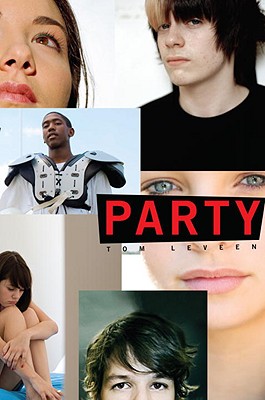
Zero
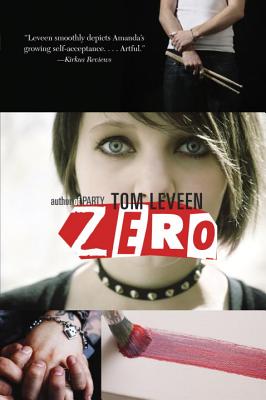
manicpixiedreamgirl
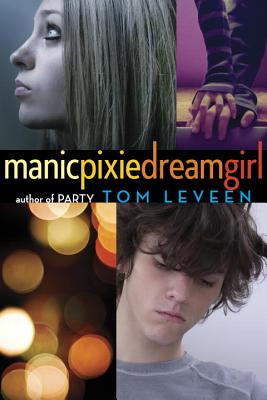 For a chance to win a signed hardcover copy of Tom's newest book, manicpixiedreamgirl, leave a comment about the interview, below! Winner will be chosen at random in one week and notified by email!! Good Luck!Tom's website: www.tomleveen.comTwitter: @tomleveenFacebook: Tom LeveenAnother great interview with Tom: Assembly on Literature for Adolescents of the NCTESee Tom at Phoenix ComiCon! Phoenix New Times review of MPDGLast but not least...What's the funniest thing you've seen online lately? The funniest thing was actually something I had to go back and look up not long ago: A piece from The Daily Show about the Navy SEALs who took out the pirates while on a boat.
For a chance to win a signed hardcover copy of Tom's newest book, manicpixiedreamgirl, leave a comment about the interview, below! Winner will be chosen at random in one week and notified by email!! Good Luck!Tom's website: www.tomleveen.comTwitter: @tomleveenFacebook: Tom LeveenAnother great interview with Tom: Assembly on Literature for Adolescents of the NCTESee Tom at Phoenix ComiCon! Phoenix New Times review of MPDGLast but not least...What's the funniest thing you've seen online lately? The funniest thing was actually something I had to go back and look up not long ago: A piece from The Daily Show about the Navy SEALs who took out the pirates while on a boat.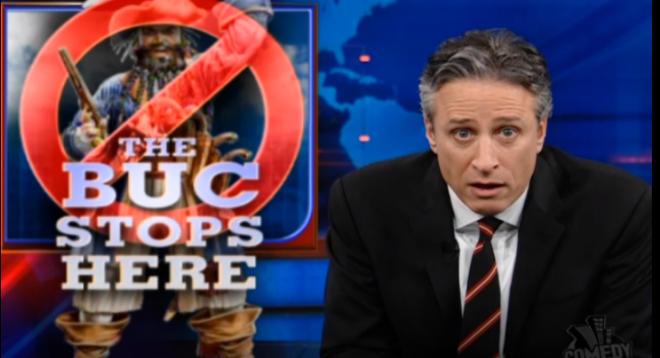 photo of Tom Leveen used by permission © John Groseclose www.photographybanned.comThanks for reading!Heidi
photo of Tom Leveen used by permission © John Groseclose www.photographybanned.comThanks for reading!Heidi
Why You Should Attend a Writer's Conference
Note: Originally posted Oct 2011 as a guest post at Will Write for Coffee. Conference season is upon us - sign up now! (lots of links to follow)Having recently attended a regional writer's conference, the speakers' words still buzzing in my head, and the buzz from my Starbuck's French Roast still twitching through my veins, I knew exactly the topic I would choose when Anne so graciously asked me to guest post here at Will Write for Coffee. So, you get this urge every time you walk past the office supply section at Target. A vortex sucks you in and forces you to stand there in front of the notebooks. You don't need a notebook. You have two at home that are half full, and you just bought one last week. It has birds or curlicues or robots on it. It's sitting on your night table, pen uncapped at the ready, just waiting for those middle of the night brainstorm ideas that you know you'll lose if you don't jot them down, RIGHT NOW. But, you think, I'd better grab this one with the kittens on it, to make sure I have a spare.You know who you are.You still have a copy of your first Judy Blume book (Tales of a Fourth Grade Nothing? Are You There, God? It's Me, Margaret? the racy Forever??) You've saved all of your favorite picture books and now read them to your kids. You have an idea for a story *POP* into your head at the most inopportune times, but you write them down. Maybe you even have a manuscript or two.Now what?You open your favorite picture book to the publisher's page, scribble down the address on a manila envelope, shove your story in there along with a cover letter that reads:
So, you get this urge every time you walk past the office supply section at Target. A vortex sucks you in and forces you to stand there in front of the notebooks. You don't need a notebook. You have two at home that are half full, and you just bought one last week. It has birds or curlicues or robots on it. It's sitting on your night table, pen uncapped at the ready, just waiting for those middle of the night brainstorm ideas that you know you'll lose if you don't jot them down, RIGHT NOW. But, you think, I'd better grab this one with the kittens on it, to make sure I have a spare.You know who you are.You still have a copy of your first Judy Blume book (Tales of a Fourth Grade Nothing? Are You There, God? It's Me, Margaret? the racy Forever??) You've saved all of your favorite picture books and now read them to your kids. You have an idea for a story *POP* into your head at the most inopportune times, but you write them down. Maybe you even have a manuscript or two.Now what?You open your favorite picture book to the publisher's page, scribble down the address on a manila envelope, shove your story in there along with a cover letter that reads:
"To whom it may concern,This is an awesome story about a teddy bear who learns to bake cookies and has a friend who is a bullfrog named Jeremiah. My kids love it! My son even drew the pictures!I hope you like it!signed,Clueless."
No, I'm not being mean or snarky, because that's pretty close to the same thing I did for my first submission. In return, I received a very concise, polite photocopy of a response they send out to all the hapless wanna-be writers out there which said, in a nutshell,
"Thanks, but no thanks."
If that's enough to deter you, if it was just a whim, and a Hail Mary shot, then good for you for trying and you can stop reading now. But if that "Thanks, but no thanks" got your hackles up and made you more determined to give it a go, read on.1) Join a critique group. You can usually find one at your local library, school, or even online. This is very scary, because now you will have to take all of those great little ideas out of your notebook and share them with about 5-10 strangers who will rip them apart. But that's good. Don't get defensive; rather, be a sponge and absorb what you learn, and don't be afraid to "kill your darlings." Be mature enough to accept critique, and give constructive criticism in return.2) Always use proper format.
This is very scary, because now you will have to take all of those great little ideas out of your notebook and share them with about 5-10 strangers who will rip them apart. But that's good. Don't get defensive; rather, be a sponge and absorb what you learn, and don't be afraid to "kill your darlings." Be mature enough to accept critique, and give constructive criticism in return.2) Always use proper format. No Futura, no Helvetica (I know, I know), and for sure no Comic Sans. When printing your manuscript, even for your critique group, always, always, always useTimes New Roman*, 12-point font; double-spaced; one-inch margins (left, right, top, bottom).This is an industry standard, and the sooner you start utilizing it, the better. The reason? While I'm not 100% sure, it's said that the serifs in the font make it easier for the eye to flow from one letter to the other; 12-point double-spaced font is just easier to read, and the one-inch margins are to allow room for editorial comments in the margins.*The only exception would be Courier font, which is more commonly used in screenplay manuscripts.3) Get your hands on a copy of The Writer's Market.The library will usually have a reference copy (one that stays in the library and cannot be checked out), and there will often be a copy that you can check out as well. If your focus is writing for children, or if you are an artist or illustrator, there is the Children's Writer's and Illustrator's Market. I cannot stress the indispensable nature of these books. If you study either or both of them the way your kids study YouTube or Facebook, you will have an amazing head start.
No Futura, no Helvetica (I know, I know), and for sure no Comic Sans. When printing your manuscript, even for your critique group, always, always, always useTimes New Roman*, 12-point font; double-spaced; one-inch margins (left, right, top, bottom).This is an industry standard, and the sooner you start utilizing it, the better. The reason? While I'm not 100% sure, it's said that the serifs in the font make it easier for the eye to flow from one letter to the other; 12-point double-spaced font is just easier to read, and the one-inch margins are to allow room for editorial comments in the margins.*The only exception would be Courier font, which is more commonly used in screenplay manuscripts.3) Get your hands on a copy of The Writer's Market.The library will usually have a reference copy (one that stays in the library and cannot be checked out), and there will often be a copy that you can check out as well. If your focus is writing for children, or if you are an artist or illustrator, there is the Children's Writer's and Illustrator's Market. I cannot stress the indispensable nature of these books. If you study either or both of them the way your kids study YouTube or Facebook, you will have an amazing head start. The first half of The Writer's Market books contain information on: how to write a query letter; format; selling to magazines; interviews with authors, including how they sold their first book; and advice from agents, many of whom will speak to what sort of material they currently need. The second half of the guide is a directory of agents, publishers and editors, what they represent or publish, and how to submit your work to them. Current is the key word here−although you will find useful information in second-hand copies, the publishing industry changes so rapidly that you will want to find the newest version available.4) Attend conferences, and join writer's organizations.It's worth the drive to your nearest city; it's worth the $150-on up registration fee. Plan ahead and save your money. The knowledge that you will gain and the acquaintances you will make−personal and professional−are worth it. For children's writers or illustrators, find your regional Society of Children's Book Writers and Illustrators (SCBWI) chapter, and attend whatever events you can. (More organizations listed below.)
The first half of The Writer's Market books contain information on: how to write a query letter; format; selling to magazines; interviews with authors, including how they sold their first book; and advice from agents, many of whom will speak to what sort of material they currently need. The second half of the guide is a directory of agents, publishers and editors, what they represent or publish, and how to submit your work to them. Current is the key word here−although you will find useful information in second-hand copies, the publishing industry changes so rapidly that you will want to find the newest version available.4) Attend conferences, and join writer's organizations.It's worth the drive to your nearest city; it's worth the $150-on up registration fee. Plan ahead and save your money. The knowledge that you will gain and the acquaintances you will make−personal and professional−are worth it. For children's writers or illustrators, find your regional Society of Children's Book Writers and Illustrators (SCBWI) chapter, and attend whatever events you can. (More organizations listed below.) In the past four years that I have attended our regional conference−and I'm not even talking about the whopper events in L.A. and New York−I have heard and/or met editors from: Scholastic, Random House, Amulet/Abrams, Chronicle, Penguin, Farrar, Straus & Giroux, Harper Collins and more. I've had a face-to-face critique with an editor from Roaring Brook. I've heard first-hand advice from agents on what they are looking for and how to submit. I've seen presentations from art directors on how a picture book is made. What catches an editor's eye and will keep them reading the next 20 pages, or make them toss it.I've also made some very good friends, and seen quite a few fellow writers go on to publication (links below).If you offer to volunteer, it will not only give you a chance to help out, you will have the opportunity to meet more people. Remember, it's not only about learning, it's also about networking.But besides learning about the industry and how to navigate it, the best residual effect of a conference is the motivation. Nothing will light a fire under your butt more than hearing the first-hand story of how a successful book made it from notebook to publisher's auction to print.
In the past four years that I have attended our regional conference−and I'm not even talking about the whopper events in L.A. and New York−I have heard and/or met editors from: Scholastic, Random House, Amulet/Abrams, Chronicle, Penguin, Farrar, Straus & Giroux, Harper Collins and more. I've had a face-to-face critique with an editor from Roaring Brook. I've heard first-hand advice from agents on what they are looking for and how to submit. I've seen presentations from art directors on how a picture book is made. What catches an editor's eye and will keep them reading the next 20 pages, or make them toss it.I've also made some very good friends, and seen quite a few fellow writers go on to publication (links below).If you offer to volunteer, it will not only give you a chance to help out, you will have the opportunity to meet more people. Remember, it's not only about learning, it's also about networking.But besides learning about the industry and how to navigate it, the best residual effect of a conference is the motivation. Nothing will light a fire under your butt more than hearing the first-hand story of how a successful book made it from notebook to publisher's auction to print.
This year we were treated to the story of Tom Leveen's YA novel, Party. There to tell the tale were Tom, his agent Jennifer Mattson, and his editor at Random House, Suzy Capozzi. Tom told us the story of how he wrote Party, Jennifer talked about how the two of them worked together on it, the process of presenting it to editors, and Suzy explained what takes the book from a point of interest, to a sale, and the final product. It was incredibly interesting, and brought the entire experience down to a more realistic, maybe even attainable level. By the way, I got a copy of Party at the conference, started reading it that night, and couldn't put it down until I finished it two days later. The last book that did that to me was The Hunger Games. So, bravo, Tom, and thank you.Attendees were given a workshop on how to pitch a book, and an opportunity to have their manuscript read and critiqued by one of the faculty, among other demonstrations.More highlights of this year's conference were: a discussion on ideas that stand out from Amulet and Abrams books senior editor Maggie Lehrman, presentation on picture book format, from Simon & Schuster associate art director, Lauren Rille; and a lesson on marketing and publicity for today's writers, by industry pro Tracey Daniels of Media Masters Publicity, who also revealed a new project called Bookigee, a completely new way to look at books, and the movies, music and everything else connected to them.In short, writing a book isn't just about the writing anymore. Sure, the writing has to be there−and has to be better than ever to compete in the market of today−but the whole experience of a book is changing. Not only to people want to read the book, they want to hear podcasts, read interviews, use interactive apps, go to events, and tweet all about it.In order to get your awesome idea from scribbled notebook to the bestseller list takes more than just throwing a manila folder in the mailbox. It takes research. Not only in your subject matter, but in the publishing industry, social networking and marketing as a whole.If it's one thing that stood out to me from the whole day, it was the idea that we, as conference attendees and SCBWI members were one step ahead of Joe Q. Writer, in preparing ourselves for the ultimate goal of publication. So go, buy that notebook, kittens and all. And put a change jar on your counter with a sign taped to it that says "WRITER'S CONFERENCE." Whenever your kids swear, or forget to do their chores, charge them a dollar - you'll have it saved up in no time.Writer's Organizations:SCBWISisters in Crime - Mystery writersRomance Writers of AmericaWriters Guild of AmericaThe International Food Wine & Travel Writers AssociationNaNoWriMoAuthors I've met through SCBWI:Shelley CoriellAmy Fellner DominySara Francis-FujimuraBarb GowanTom LeveenMichelle Parker-RockJanette RallisonSharon SkinnerAuthors I've met through library-hosted critique:Deb LedfordVirginia NoskyPascal MarcoNot to mention Anne - but I've known her since way before any of this writing stuff :)
So go, buy that notebook, kittens and all. And put a change jar on your counter with a sign taped to it that says "WRITER'S CONFERENCE." Whenever your kids swear, or forget to do their chores, charge them a dollar - you'll have it saved up in no time.Writer's Organizations:SCBWISisters in Crime - Mystery writersRomance Writers of AmericaWriters Guild of AmericaThe International Food Wine & Travel Writers AssociationNaNoWriMoAuthors I've met through SCBWI:Shelley CoriellAmy Fellner DominySara Francis-FujimuraBarb GowanTom LeveenMichelle Parker-RockJanette RallisonSharon SkinnerAuthors I've met through library-hosted critique:Deb LedfordVirginia NoskyPascal MarcoNot to mention Anne - but I've known her since way before any of this writing stuff :) Many of these people are the ones who've taught me what I've learned so far, and what I've attempted o pass on to you. I hope you will find wisdom and inspiration in their lessons, as I have.Now get your notebook and start writing!
Many of these people are the ones who've taught me what I've learned so far, and what I've attempted o pass on to you. I hope you will find wisdom and inspiration in their lessons, as I have.Now get your notebook and start writing!



